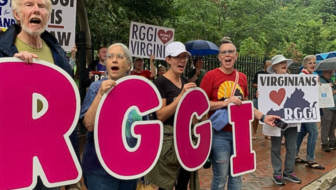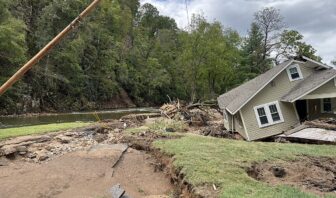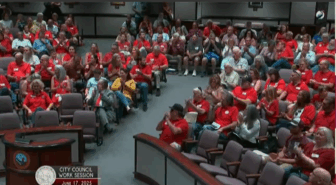Chesapeake Climate Action Network applauds General Assembly for passing landmark offshore wind legislation, while expressing disappointment that ‘black liquor’ and fracking moratorium bills fell short
ANNAPOLIS—The 2013 Maryland General Assembly session will be remembered as a historic turning point for clean energy in Maryland, as legislators passed landmark legislation to develop offshore wind power, the state’s most abundant clean energy resource. However, the General Assembly’s overall record on climate and clean energy issues was a mixed bag this year, as two bills that would significantly impact the climate fell short: the “black liquor” bill (SB 684/HB 1102) and the fracking moratorium bill (SB 601/HB 1274).
“Governor O’Malley and the 2013 Maryland General Assembly took a historic step forward for clean energy in Maryland,” said Mike Tidwell, executive director for the Chesapeake Climate Action Network. “They positioned our state to lead in a major new East Coast industry—offshore wind power—that will create jobs, improve public health and protect the climate.”
“Leaders in Annapolis, including the governor, Senate President, House Speaker, and chairmen of the Senate Finance and House Economic Matters Committees went to bat to make sure the offshore wind legislation passed this year. Thanks to these leaders, we’ll be reaping the benefits of new jobs and cleaner air from the offshore wind industry for as long as the wind blows off our coast,” said Tidwell.
“While the top climate priority, the offshore wind bill, passed with overwhelming support, work remains to protect the state from the many potential harms of fracking for natural gas and to make sure our renewable energy dollars are spent on new clean energy as opposed to existing polluting facilities,” added Tidwell. “Bills to fix our state’s renewable energy standard—a policy that would generate up to 1,400 megawatts of new clean energy—and to enact a statutory moratorium on natural gas fracking each fell one vote short in different committees.”
The “black liquor” bill came one vote short, 11-8, of the 12 needed to advance out of the House Economic Matters Committee, while it passed the full Senate with overwhelming, bipartisan support. The bill would remove out-of-state black liquor, a dirty waste byproduct of paper mills, from Tier One, the top level, of the state’s Renewable Portfolio Standard (RPS). Doing so would help bring as much as 30 percent more clean energy like wind power to Maryland over the next decade. The bill also would have protected and created Maryland jobs, guaranteeing that the only major Maryland paper mill, Luke Mill, would retain its subsidy for as long as the 125-year-old facility continues to operate.
“Senator Rob Garagiola and Delegate Johnny Olszewski were true clean energy champions this session. They worked tirelessly as the lead sponsors of the ‘black liquor’ bill, which would have stopped our renewable energy dollars from flowing to out-of-state polluters and redirected them toward new clean energy,” said Tidwell.
State legislation to place a statutory moratorium on the controversial gas drilling practice known as fracking came within one vote of passing the Education, Health and Environmental Affairs Committee of the Maryland Senate. Senator Bobby Zirkin and Delegate Heather Mizeur were the lead sponsors in the effort.
“As for the fracking moratorium bill, we hit the ball to the warning track, and almost out of the park,” said Tidwell. “We’ll only grow and not slow down until we can positively say that no Marylander will ever face the widespread harms linked to fracking in nearby states. The more the public learns about fracking, the more concerns they have about the impacts of drilling on our drinking water, health, climate, and local communities.”
The Chesapeake Climate Action Network worked with a wide variety of groups across the state to advance these issues this session and remains committed to working with our partners to ensure Maryland leads toward addressing our climate crisis and advancing clean energy. The solutions we adopt here could ultimately be replicated across the country and abroad.
Contact:
Mike Tidwell, 240-460-5838, mtidwell@chesapeakeclimate.org
Kelly Trout, 240-396-2022, kelly@chesapeakeclimate.org
###




